From the scene- (and heart-) stealing seniors in Hustlers and The Farewell last year to the super-chic Fashion Grannies flexing on TikTok and Awkwafina is Nora From Queens this year, pop culture has been onto something I’ve known my whole life: Chinese grandmas are goals, with many valuable lessons to impart and embrace. With an eye for the practical and functional in the style department, they are also ones to copy — especially in 2020 when, thanks to a pandemic, the only people we’re dressing for are ourselves.
My late maternal grandmother (or Wai Po) had a consistent uniform: a Mandarin collar or mock neck top in a colorful print or luxe texture, elastic waist pants, and flat slip-on shoes. From the second she woke up and started her daily breathing exercises, she was always put-together. But her wardrobe also served practical needs: After my grandfather passed away, she raised three young kids on her own — and went on to rear three grandkids in Taipei. When she’d visit the States for extended summer visits — and we’d spend the days bingeing Chinese telenovelas, while enjoying the best snacks, like watermelon seeds, and American fried food — her versatile looks served as almost proto-loungewear. But for dinner parties and mahjong nights, Wai Po, who was always the life of the party, would dress up in elevated versions of her signature. I can still hear her boisterous laugh, amongst the constant clicks of mahjong tiles and the jade bracelets.
My paternal grandmother (Nai Nai) remains more of a glamorised memory, as she passed away when I was in elementary school. I do have recollections of spending summer vacations in Taipei and being impressed and slightly intimidated by her — especially after a stern scolding when I refused to go to Chinese lessons. A government official’s wife, she was proper and elegant, always in custom-made outfits, even at home. She pinned her hair back in a polished bun, carried leather top-handle handbags, and wore delicate jewellery. I remember her tailored Mandarin collar blouse and below-the-knee skirt sets — most notably a chic gold-and-black brocade ensemble to accompany my grandfather (Ye Ye) to an award ceremony.
The clothes became a gateway to tell stories about their immigration, about their lives as seniors in these urban centers, and a celebration of all those things.
valerie luu
Writer Valerie Luu and photographer Andria Lo also treasure sartorial memories of their family matriarchs who immigrated to North America. While on dim sum dates in San Francisco’s Chinatown, the two friends also delighted in the sense of style of the neighbourhood seniors. Luu and Lo first documented their subjects on a popular Instagram account, Chinatown Pretty, which evolved into a recently released book, Chinatown Pretty: Fashion and Wisdom from Chinatown’s Most Stylish Seniors.
“They wore layers of colour, like six shades of pink or four floral patterns, all in one outfit. So we wanted to know at first, like, ‘Where did they get their shoes? How did they put this outfit together?!’” explains Luu, on Zoom. “From there, the clothes became a gateway to tell stories about their immigration, about their lives as seniors in these urban centres, and a celebration of all those things.”
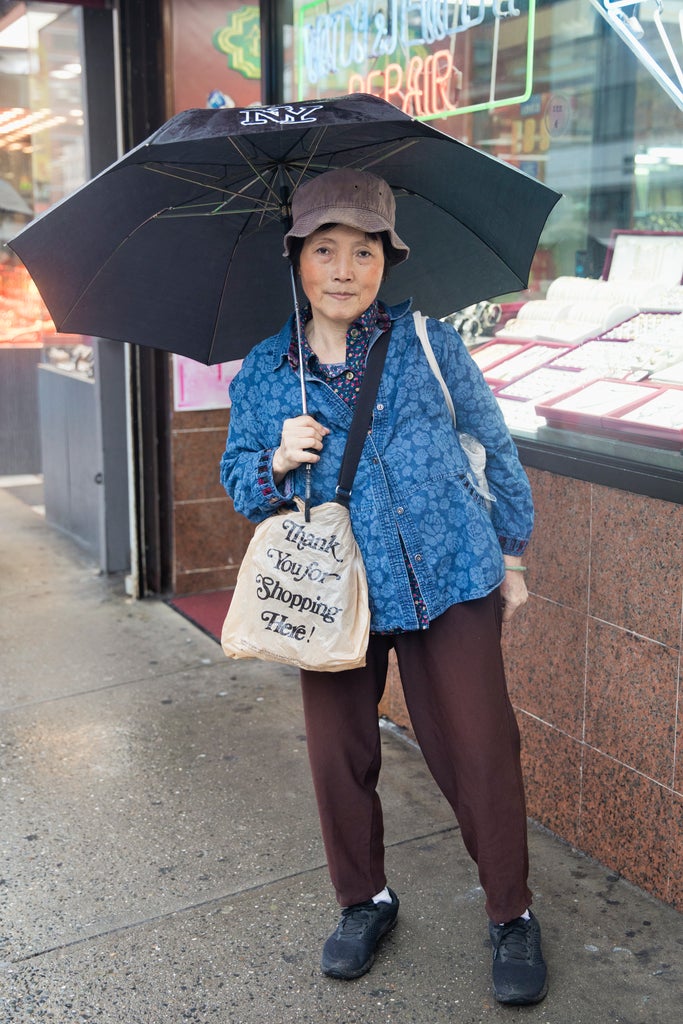
Chinatown Pretty features over 100 photographs of seniors in their own self-expressive — and very Instagrammable — outfits, accompanied by moving interviews. For instance, C.P, spotted on Manhattan’s Canal Street, skillfully wears three layers of floral button-downs while accessorising with a purple bucket hat and a cross-body protected bag from the rain with an artfully-rigged “Thank You for Shopping Here!” plastic bag, Poppy Lissiman– or Demna Gvasalia for Balenciaga-style.
“We came up with [the term ‘Chinatown pretty’] to describe this eclectic patchwork of different patterns, textures, colours, eras, handmade, gifted, new, all in one outfit,” says Lo, also on Zoom. “Along with some very important value-driven accessories, like rain protection, sunglasses, gloves, and lots of these very utilitarian details.”
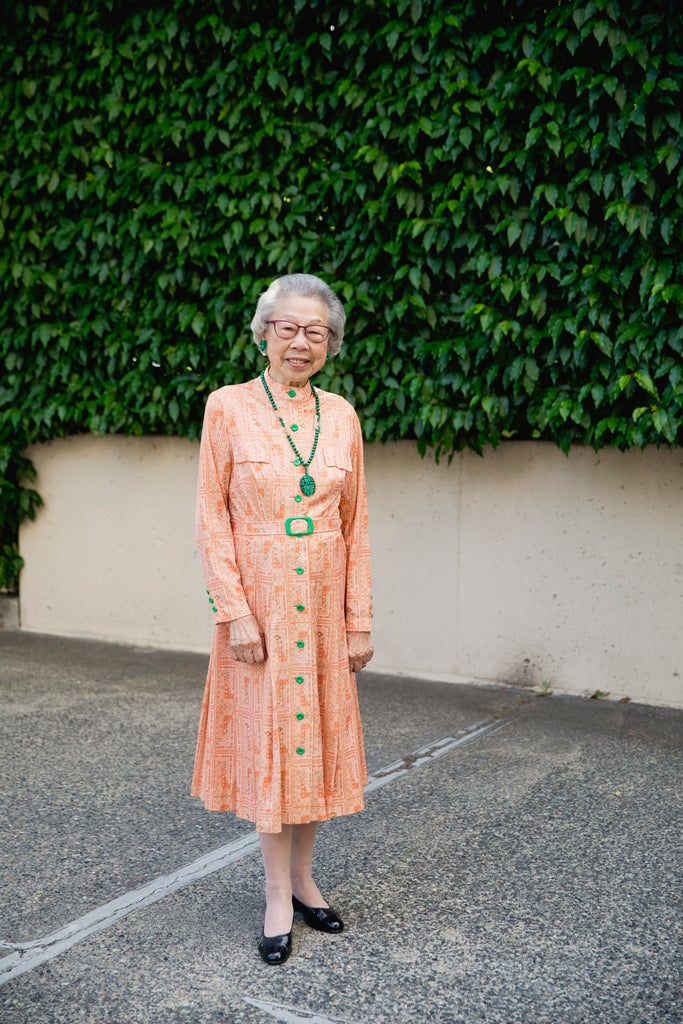
The Vancouver Chinatown section features Luu’s incredibly chic step-grandmother, Anna Lee, who retired and settled in Canada after an accomplished career in social work in colonial Hong Kong. In the book, Lee models her refined custom-made pieces, including an orange graphic-print shirtdress, exquisitely accented with jade-green buttons and belt-buckle, and an emblem-printed pussy-bow blouse tucked into tapered red trousers. The tribute in the book feels especially poignant, as Lee recently passed away.
“I inherited half her closet, and she gets to live on in my everyday wear,” says Luu, who recently wore her dress with a bequeathed faux fur coat to channel her “old world glamour” aesthetic. “It affects the way that I feel, and you dress for the way you want to feel. The way she felt to me was really graceful.”
Looking back, on my wedding day, I wore Nai Nai’s vintage gold Rolex and carried her ’60s-era metallic wristlet clutch. The leather was kind of peeling at the edges, but, to me, that felt worn-in and familiar. (I also re-wore Jimmy Choos I bought on sale with a gift card years earlier, which is a pretty Chinese grandma move, if I think about it.) I’ve been regularly wearing her classic diamond studs ever since my mom let me have them in college, although these days restyled in a mismatched way.
Chinese grandmas faithfully maintain and value their hard-earned (and beloved) pieces, which were often bespoke from the old country. The pieces connect back to their roots and celebrate their journeys, but also speak to practicality and value. Through their day-to-day living, these seniors are pioneers of the same artisan, DIY, and sustainability movements now commonly touted by city-dwellers.
“They’ve been growing fruit in their backyard. They’ve been going to the grocer every day for fresh produce and they take care of their clothes… so it lasts a really long time,” says Luu. Take, for instance, the recent uptick in crafting. Before knitting became a cool kid pastime on TikTok, my Wai Po was replicating a cute little crop top out of a Seventeen feature during my teen years.
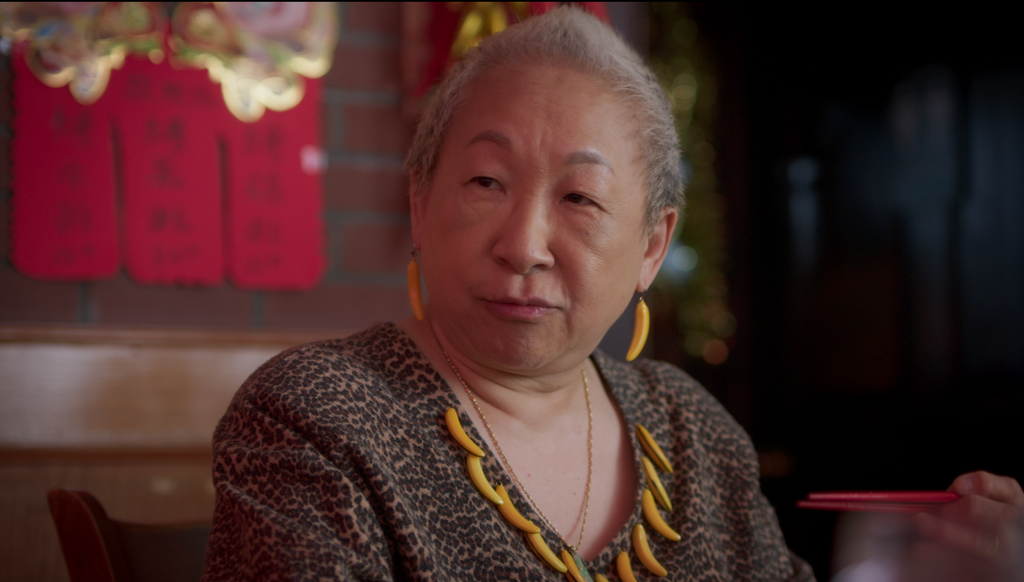
Seattle-born Lori Tan Chinn, who plays the Lin family matriarch in Awkwafina is Nora From Queens, originally considered going into costume design, and would sew her own high fashion pieces in the ’80s. While Chinn’s own infectious, no-filter personality influences her character, Grandma, via her straight-fire — and often F-bomb-laden — improv talents, her equally spicy and resourceful fashion sense also makes a significant impact. On an expletive-filled trip to the bank with granddaughter Nora (Awkwafina), Grandma makes an extra swaggy statement in one of Chinn’s longtime wardrobe staples: a ’70s-era matching leopard print set from the now-shuttered Orhbach’s department store. On a whim, Chinn brought the ensemble on set to show costume designer Staci Greenbaum.
“She flipped over it. I never thought they’d let me wear it, but yeah, fine,” shrugs Chinn, outfitted for our Zoom convo in a beaded collar in honour of Ruth Bader-Ginsberg (she has a few) and a “Carter 2020” sweatshirt. (She likens her style to Billy Porter’s, but in a scrappier, DIY-sort of way.)
Chinn proudly shows me her treasure trove of beads amassed from ‘60s-era trimmings emporium Sheru, including a Ziploc bag packed with wooden bananas. (After an exhaustive online hunt, she snapped up about 300.) Greenbaum used the beads to further enhance Grandma’s leopard look and made her matching dangly earrings.
On a roll, Chinn excitedly brings out more Nora From Queens-themed trinkets, including a colourful charm bringing a Georgia O’Keefe painting to mind. “Do you know what this is?” she asks, with a mischievous smile. “… a vagina?” I ask, bringing my face closer to the screen. “Yeah!” responds Chinn, in the most Grandma voice. (Awkwafina kicked off her career with her viral YouTube video “My Vag,” and genitalia is a running theme on the show.)
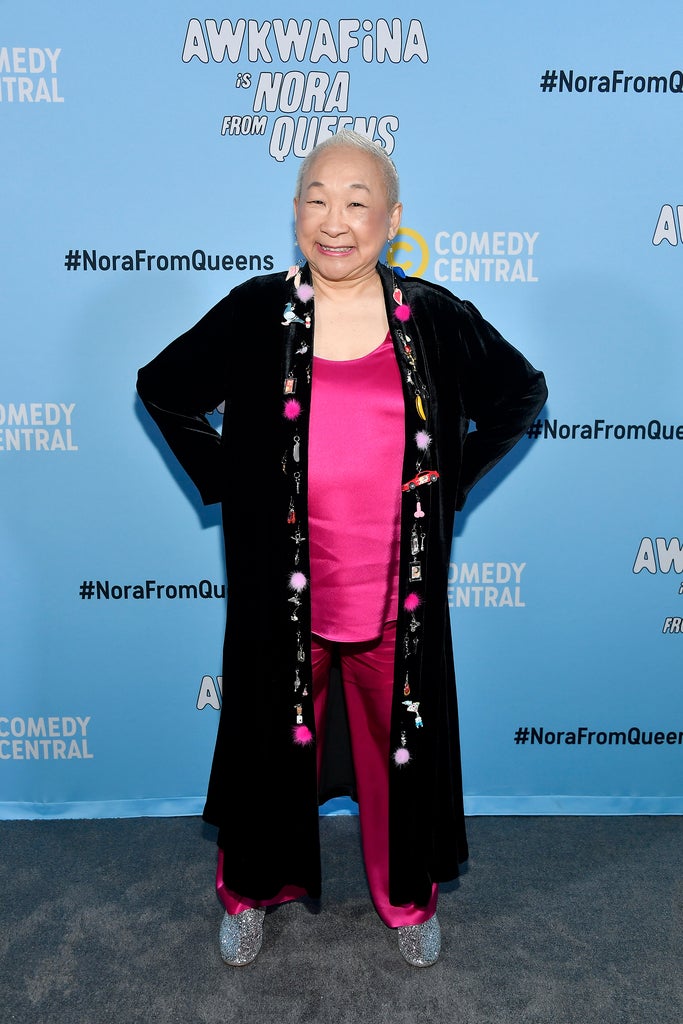
For the premiere party, Chinn customised the lapels of her velvet Eileen Fisher robe-jacket with the vagina charm and other Easter Eggs, like a garbage can, a silver dumpling, and a penis referencing dad Wally’s (B.D. Wong) Instagram faux pas. She also splurged on sparkly Miu Miu heels.
“Cost me my rent!” says Chinn. “I bought them on sale. But for the premiere night, I couldn’t resist.”
That bomb leopard outfit wasn’t the only real life-to-screen style crossover. During rehearsals, Greenbaum noticed Chinn’s penchant for wearing T-shirts with statements, like “Asians Don’t Raisin,” which Grandma later wore to close out the queef-themed episode six. (Vagina charms, see?) Of course, Chinn sees the humour in the tee — she even gifted co-creators Awkwafina and Teresa Hsiao their own — but the shirt also offers a practical efficiency.
“It’s all-black, too, so I don’t have to wear a bra,” says Chinn.
Her collection of statement tees that don’t require undergarments includes one featuring Tina Belcher from Bob’s Burgers and the slogan “smart, strong, sensual,” to zip around town on her electric scooter (masked and armed with a helmet and first aid kit). In August, Chinn wore another shirt celebrating her Hoisan heritage to an anti-Asian racism rally hosted by rapper China Mac. The crowds also marched in support of the 89-year-old Chinese senior, who was attacked and set on fire in Brooklyn earlier in the summer.
The COVID-19 pandemic has economically battered Chinatowns and Chinese-owned businesses. Hate crimes against Asian Americans have drastically spiked, as encouraged by loser POTUS 45’s xenophobic and racist hate speech. So the summer arrival of dark comedy Lucky Grandma offered timely and much-needed messaging, thrills, and laughs. Directed by Sasie Sealy and co-written with Angela Cheng, the indie film is both a love letter to Chinatown and the titular octogenarian, who chases her luck at the casino, while not realising her true fortune lies closer to home. Crabby, chain-smoking, and truly gives-zero-fucks Grandma Wong uses her gritty street smarts and morning swim-honed dexterity to extricate herself from the potential misfortune. (The movie has also partnered with Welcome to Chinatown to raise funds for the community.)
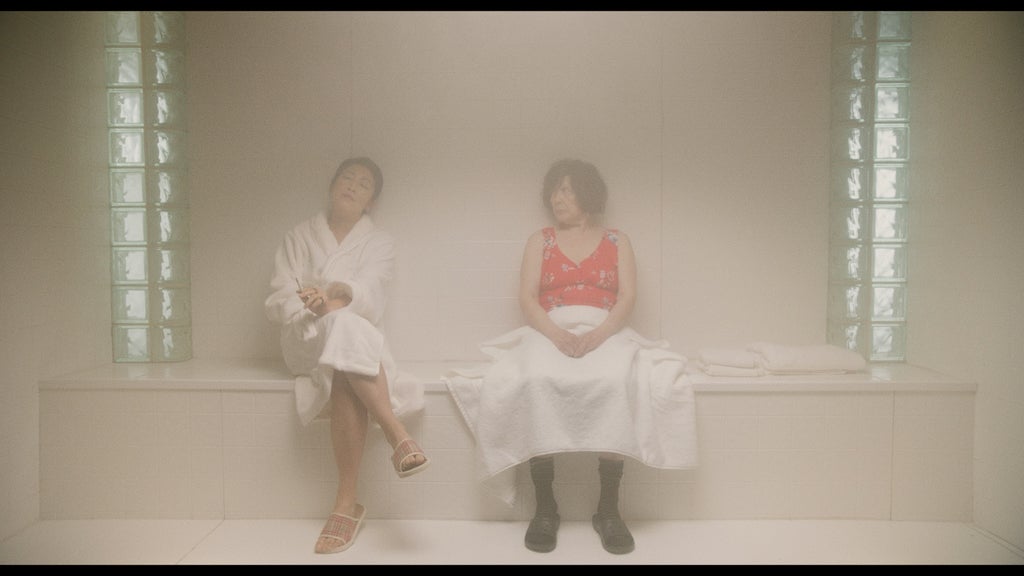
Along with scouring the Chinatown Pretty Instagram, costume designer Aubrey Laufer and Sealy spent two weeks in Manhattan Chinatown searching for inspiration. “We were like fashion bloggers or The Sartorialist,” says Sealy, on a call. Grandma Wong’s lucky red puffer jacket (top photo), often worn over a printed shirt in a fortuitous colour palette of reds and golds, serves a functional purpose, while also signifying an empowered “superhero cape.”
But, my favourite Grandma Wong ‘fit is her scarlet red and floral-printed bathing suit. While the one-piece is sassy, with the V-neckline and flounce-y skirt, it’s her black dress socks with black rubber slippers combo that served as the pièce de résistance during a nail-biter steam room scene. My mind momentarily wandered as I considered translating Grandma Wong’s steeze into ankle socks, designer slides, and a printed baby-doll dress for a different (and not so life-threatening) occasion.
But behind-the-scenes, Grandma’s cop-worthy post-swim lewk resulted from a practical request from the 85-year-old lead Tsai Chin, who is an accomplished — and very glamorous IRL — stage and screen legend on both sides of the pond and mainland China. (This cougar print top!)
“Tsai basically did not want to take off her socks. She said that at her age, her feet get cold. So we were like, ‘Ok, you don’t have to take off your socks,’” says Sealy, adding, “She’s not unlike Grandma in many ways.”
Sure, the black dress socks served a purpose while filming, but, to me, they felt like a character choice to portray fierce, brazen, and definitely empowered Grandma Wong. Like her real-life cohorts, her inventive, yet utilitarian outfit tells a story, shows resourcefulness, and radiates an irrepressible spirit and energy — while also offering inspiration for others.
“Don’t give a shit, don’t give a fuck [attitude], mixed with functionality, somehow equals really cool, really joyful pow,” says Luu. “That’s something I’m taking away from 2020.”
Like what you see? How about some more R29 goodness, right here?
An Update On The Darling Grandma From <em>The Farewell</em>